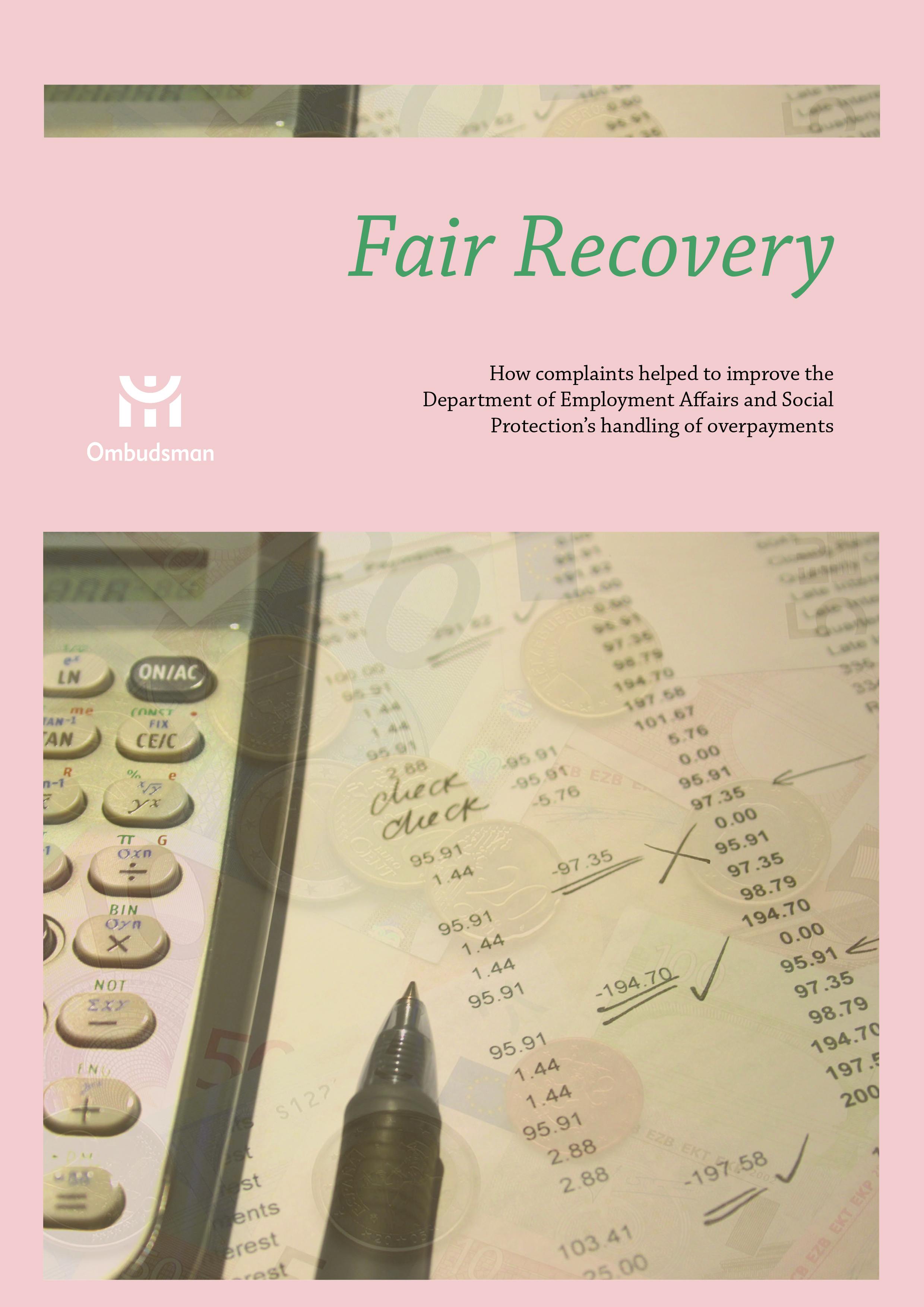Ombudsman concerned over how Department recovered social welfare overpayments
Ombudsman Peter Tyndall today published a report setting out how the Department of Employment Affairs and Social Protection has addressed his concerns about the recovery of overpayments made to social welfare recipients.
In his report, ‘Fair Recovery’, the Ombudsman says that he had seen cases where, through no fault of the recipient, an overpayment had been made, and where:
- the Department had little or no documentary evidence of the overpayment;
- there were inconsistencies across the country as to how overpayments were being dealt with;
- overpayments were deducted from inappropriate sources;
- there was no evidence that the Department ‘poverty-proofed’ the recipient’s circumstances before starting deductions; and
- there was no communication from the Department with some recipients for years after an overpayment had been discovered.
 However, the Ombudsman has commended the Department for its positive engagement with his Office and putting measures in place to tackle the issues highlighted in his report.
However, the Ombudsman has commended the Department for its positive engagement with his Office and putting measures in place to tackle the issues highlighted in his report.
Between 2015 and 2018 the Ombudsman received 108 complaints from people who were unhappy about how the Department was pursuing overpayments it said it made to them. The Ombudsman upheld a high percentage of these complaints (45%). His staff also visited local offices to examine other overpayment files.
The Ombudsman said:
“While the Department must be allowed to recover payments in appropriate cases, these must be dealt with in a fair and equitable manner. That did not happen in a significant number of cases I have seen. However, I am pleased that the Department has worked with my Office to resolve individual complaints, and improve its procedures.”
Measures implemented by the Department following engagement with the Ombudsman include:
- updating guidance and training for staff dealing with overpayments;
- a review of local complaint handling;
- the establishment of a new call centre to deal with claimants in debt; and
- the introduction of a system for issuing debt reminders.
The Ombudsman’s report, available on www.ombudsman.ie, describes some of the complaints the Ombudsman examined including:
Case Study 1: Man told he owed €17,000 to Department when he applied for Invalidity pension
When a man applied for an Invalidity pension in 2016 the Department of Employment Affairs and Social Protection said he owed the Department €17,000. The Department said the money was due to it as it had overpaid his Jobseeker’s Allowance between 1998 and 2000. The man had not received any previous notification about the overpayment from the Department.
The man requested his file under the Freedom of Information Act but his file had been destroyed. The Department confirmed to the Ombudsman that it could not locate his file and it could not provide evidence that an overpayment existed. In the circumstances it agreed to cancel the overpayment.
Case Study 2: Department sought €10,000 from man but file was missing key records
A man complained to the Ombudsman when the Department of Employment Affairs and Social Protection sought to recover €10,000 it said it overpaid him. The overpayment was in respect of Jobseeker’s Allowance but the man disputed that he had been overpaid.
The Ombudsman discovered that the Department had failed to keep proper records, had not properly engaged with the man and had allowed the situation to escalate. The Ombudsman asked the Department to review the case. The Department cancelled the overpayment and refunded the amount it had already recovered.
When the man received his first payment of Jobseeker’s Allowance he had queried it with the Department. However, the Department assured him that the amount was correct. The man had also supplied all the relevant information to the Department when he had initially applied for the allowance, including details of his wife’s maternity benefit and the date of her return to work. However, the Department lost his documents and he had to resubmit the same documents on at least three occasions.
After being notified of the overpayment the man met with the Department and was again asked for documentation relating to his wife’s return to work which he again supplied. The man also experienced delays in replies to his calls and letters.
There was no record of the man’s calls and letters on the Department’s file. Neither was there a record of his meeting with the Department. The Department also acknowledged that it had been told of his wife’s return to work but it had not acted on the information. The Department had also failed to inform the man that he could appeal the overpayment.